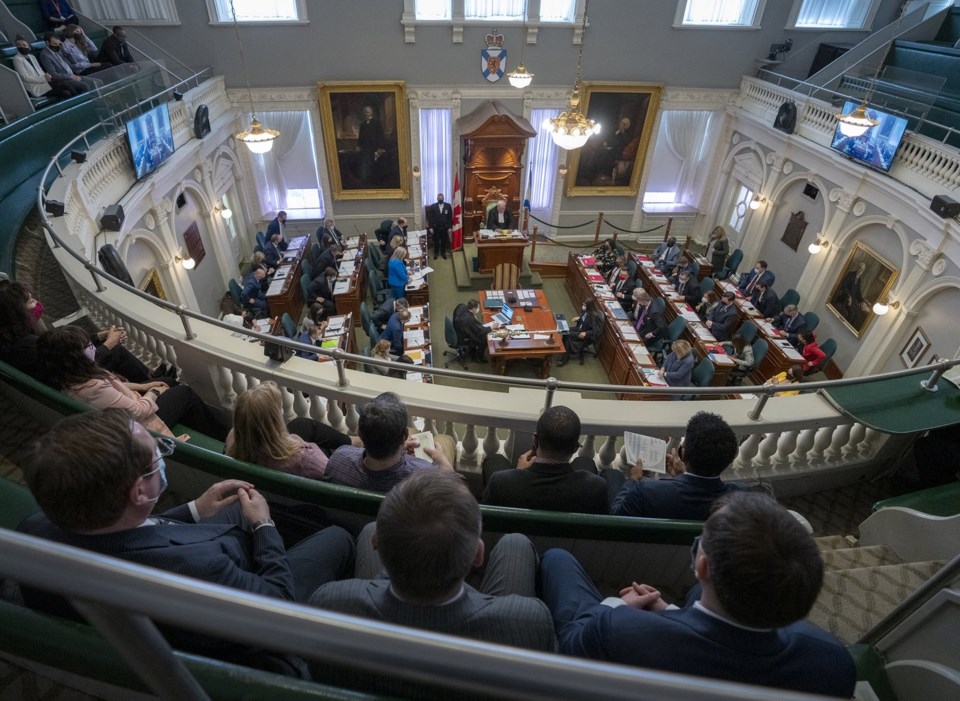HALIFAX — Premier Tim Houston showed little interest in downplaying early election speculation as the Nova Scotia legislature opened for its fall sitting on Thursday.
Nova Scotia doesn't have a legislative calendar — members are called to the House of Assembly at the direction of the governing party. But election speculation has mounted after the governing Progressive Conservatives recalled the House much earlier than usual, with Houston telling reporters "there’s work to be done.”
“This is a session where we will focus on the economy, focus on jobs and focus on workers, and we will try to clear regulatory hurdles so we can grow the economy and get good jobs for people,” he said.
Houston deflected questions on whether he is contemplating an early election call.
“That’s not something I’m talking about or focused on … we’re just focused on governing,” the premier said.
But in June, Houston cast doubt on whether he would adhere to the fixed provincial election date his party passed into law soon after coming to power, setting the date for July 15, 2025. Meanwhile, the summer months saw a heavy schedule of government funding announcements and a flurry of riding candidate nominations.
Tom Urbaniak, a political scientist at Cape Breton University, says the early return to the legislature is “potentially significant and does preserve the option of a fall election.”
Typically House sittings aren’t held until later in the fall — late September or into October or even later.
Urbaniak also noted that the premier himself set off the election speculation when he said he wasn’t wedded to the fixed election date.
The timing of a Nova Scotia election would depend on the federal political calendar, Urbaniak said in an interview Tuesday, before federal NDP Leader Jagmeet Singh announced he had ended a deal with the federal Liberals that had propped up the minority government. The end of the so-called supply and confidence agreement doesn't trigger a federal election, but makes one more likely.
“Right now we are in this season where all of the provinces and the country’s problems seem to be getting pinned on (Prime Minister) Justin Trudeau,” Urbaniak said. “That dynamic still exists and Tim Houston would love to have an election with that dynamic still in place. I’m not sure Houston himself has decided at this point, but he’s keeping his options open.”
Nova Scotia's Opposition Liberals and the NDP say they are ready for any scenario and remain focused on their own priorities for the sitting. Both parties say they will highlight the need to deal with cost of living issues, including the shortage of affordable housing and lack of access to primary health care.
“People are talking about it (an election) because he (Houston) made it very clear that his fixed election date is not a promise that he might be interested in keeping,” said Liberal Leader Zach Churchill. “We’re prepared if there’s one called tomorrow.”
NDP Leader Claudia Chender said she’s not surprised by Houston’s refusal to be more specific about his plans despite the fixed date.
“There is a huge partisan advantage in controlling the date of an election,” Chender said.
Meanwhile, the government introduced two bills Thursday, including one that would significantly increase the amount of unpaid time off for Nova Scotia workers who develop a serious illness or are severely hurt on the job. If the bill becomes law, workers will get up to 27 unpaid weeks off without fear they will lose those jobs.
Members of the legislature also elected a new Speaker, choosing Tory backbencher and former deputy speaker Danielle Barkhouse for the position. The election was made necessary after April’s sudden resignation and retirement from politics of the legislature’s first female Speaker, Karla MacFarlane.
This report by The Canadian Press was first published Sept. 5, 2024.
Keith Doucette, The Canadian Press



